THE GHOSTS OF WIDEN - Dead Miners Graves Have Only A Number
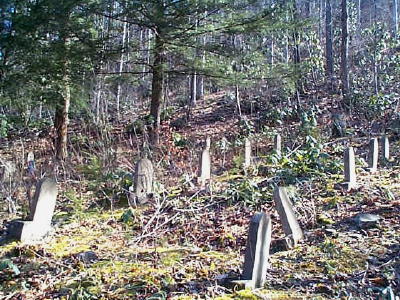
Numbered graves in Widen Cemetery, mostly immigrants and blacks
The concrete tombstones have numbers with no names, about one hundred graves, in the almost forgotten Widen Cemetery on Buffalo Creek, down the holler from the faded Clay County mining town of Widen.
A map shows the first burial in the steep hillside cemetery was about 1912, with sections for Catholics, White Protestant and Colored. Vines, small trees and brush cover the burial ground, with some recent efforts to clean it up.
Many of the graves are occupied by children who died at birth or from epidemics that swept through the community in the early part of the century. A number of men were killed in mine accidents.
Many residents of West Virginia coal camps were recent immigrants and blacks.
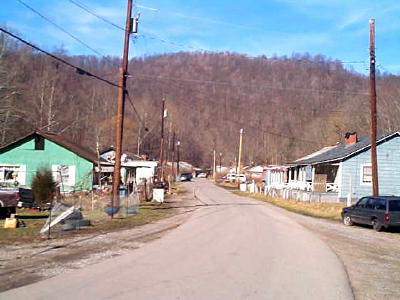
Old company houses are privately owned
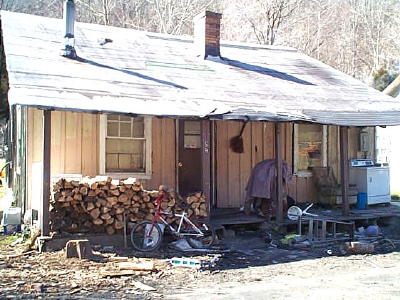
Houses were all painted red and white and once rented for $4-$6
Widen was once a prosperous mining town of 2,500 people and 500 houses in 1925, whose life continued into the 1960's, barely surviving one of West Virginia's violent coal strikes.
It is a ghostly image of its former self, with a few company houses remaining, some in great disrepair. There are a number of families with roots deep in the community, having dug in or returned from out of state to their ancestral village. They enjoy Widen, their home, with great pride.
Hundreds of Widen descendants return to "Widen Days" held the last Saturday in July.
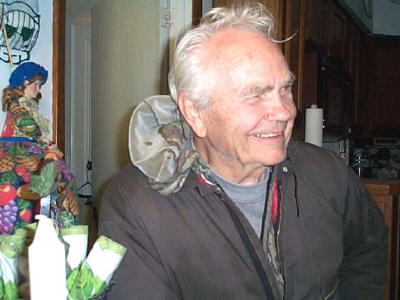
"Mayor of Widen" Punk Young remembers old days
Widen is remembered by people like "Punk" Young, who some call the unofficial Mayor of Widen (Now Deceased). Young grew up in the town, graduating from the Widen High School in 1946 before going to Cleveland to become a firemen. He and his family returned in 1984.
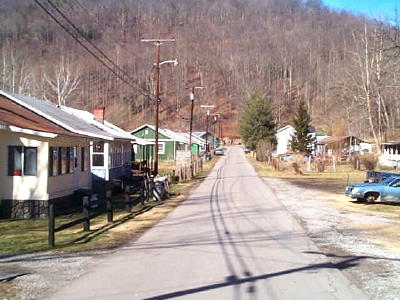
Current Widen residents maintain their roots in the community
"The town was well maintained during those early years by the coal company," said Young, unlike some coal operations in West Virginia. J. G. Bradley was the President of the Elk River Coal and Lumber Company.
He and his family provided conveniences and services to the coal communities of Dundon, Swandale and Widen, connecting them by railroad to the Elk River.
The line was built between 1909-11, with the Town of Widen being named for railroad engineer L. G. Widen. The train ran through the mountain valleys three times a day, with passenger service available.
Benjamin R. Hamrick remembered owner J. G. Bradley. "Mr. Bradley was a good man, and he took care of his employees regardless of so many tales to the contrary."
Hamrick said the state and county law officers would not come to the private property owned by the company without a warrant, so coal bosses would enforce the law with the threat of losing a job. He said he worked on a conveyor in 1946 for $11 a day.
"The houses were nice, painted red and white. The company always kept them repaired," he said. The houses were rented for $4 to $6 a month, and some had phones.
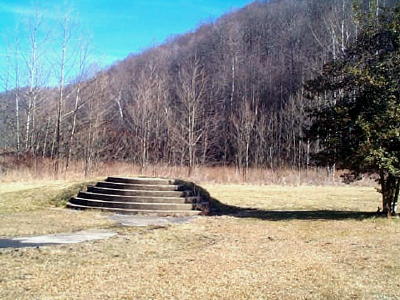
Steps to the "excellent gym" remains,
schools and commercial buildings are
gone
The most used building in the town was the combination store, company office and post office. The coal company built a YMCA and a large gym for recreation.
There was a bank, schools, bowling alley and movie house. Hamrick said all was open to colored people, except the Sportsman's Club, which was "mostly for the upper class." The town had a company doctor.
The electric plant provided lighting to the community in 1913, with power run into the mines on copper wire. The town even had its own newspaper "The Widen News."
The Presbyterian and Baptist churches were established, but the colored maintained their own house of worship and school.
"I feel the colored would have been welcome in the white church, but I think they preferred it that way," said Hamrick. "There were no racial problems."
Hamrick said "The coal was loosened from the seam by powder. A hole was drilled and the powder put in the hole. A battery was used to discharge the blasting cap." The coal was then hand-loaded.
When Clinchfield Coal purchased the operation, the houses were sold and the company properties began to fall down.
A Widen resident said "It is only fitting to say that beauty can be found everywhere (in Widen), even if it is partially hidden by a covering of coal dust."
Today, when visiting the long-gone prosperity, there is a presence of people and a time which will be forgotten, lingering ghosts who lived between the rough-shod hills of Clay County in the Town of Widen.
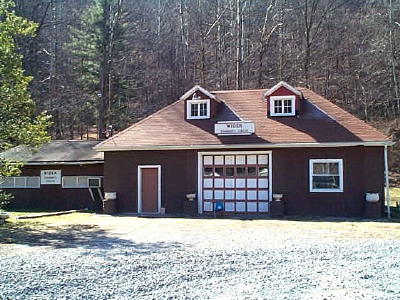
Widen's community center was former fire department building
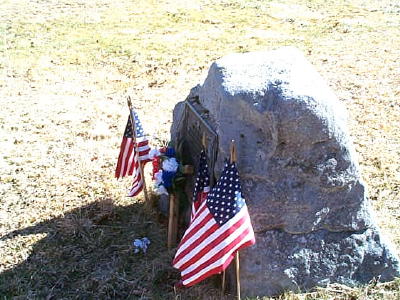
Monument a tribute to Widen men who served in World War II
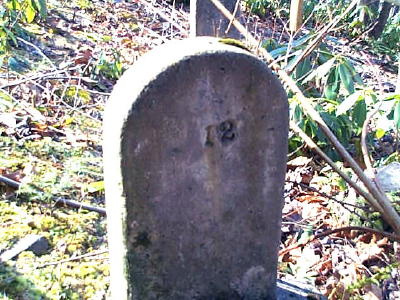
Numbered grave, a stark reminder of life in a West Virginia coal camp
SCABS, GINNEY WINKS AND GREASED BREAD - Widen Mine Wars Recalled
COAL MINE LIVIN' AT WIDEN-DILLE - "Prayin' Down To Hell"
EARLY DAYS OF WIDEN AND DILLE - Given Recalls Early Clay County Days
FADING WIDEN DAYS IS NO LONGER HELD